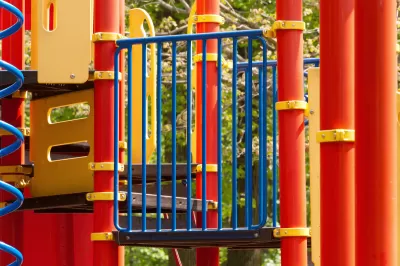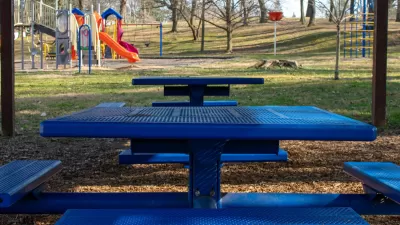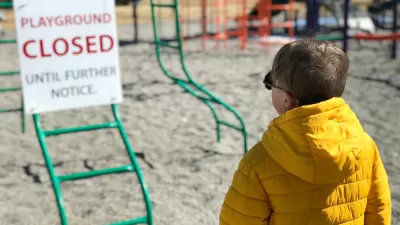New research in child development is giving rise to playgrounds designed to build children's confidence in facing challenges and evaluating risk, Sumathi Reddy reports.

Ask any American, anywhere in the country, what a playground looks like, and you'll likely hear the same thing: A swingset, a slide, a set of monkeybars. Now, child development experts are challenging our idea of what makes a healthy, productive play environment for our children.
Conventional playgrounds, the argument goes, offer little room for healthy risktaking in play. When playground equipment is reduced to a safe space for children to run around in, it becomes a way to pass the time, rather than a place for children to challenge themselves and learn to overcome their fears. "The result," writes Reddy, "is that children are less compelled to play outside, potentially stunting emotional and physical development and exacerbating a nationwide epidemic of childhood obesity."
In response, cities across the country are turning to new trends in stimulating playgrounds that have already taken root in Germany, Norway, and England. From Atlanta to Boston to Memphis to Saratoga Springs, Utah, communities are installing ziplines, climbing nets, and other such "risky" equipment, seizing on the idea that "encouraging free play, in an age of structured activities and computer games, is... important in helping children develop physical and cognitive competencies, creativity and self-worth."
"'It's important that play environments are as safe as necessary, not as safe as possible,' said [Ellen Sandseter of Queen Maud University College of Early Childhood Education in Norway], adding that broken and fractured arms and legs shouldn't be considered serious injuries."
FULL STORY: Playing It Too Safe?

Alabama: Trump Terminates Settlements for Black Communities Harmed By Raw Sewage
Trump deemed the landmark civil rights agreement “illegal DEI and environmental justice policy.”

Study: Maui’s Plan to Convert Vacation Rentals to Long-Term Housing Could Cause Nearly $1 Billion Economic Loss
The plan would reduce visitor accommodation by 25% resulting in 1,900 jobs lost.

Planetizen Federal Action Tracker
A weekly monitor of how Trump’s orders and actions are impacting planners and planning in America.

Wind Energy on the Rise Despite Federal Policy Reversal
The Trump administration is revoking federal support for renewable energy, but demand for new projects continues unabated.

Passengers Flock to Caltrain After Electrification
The new electric trains are running faster and more reliably, leading to strong ridership growth on the Bay Area rail system.

Texas Churches Rally Behind ‘Yes in God’s Back Yard’ Legislation
Religious leaders want the state to reduce zoning regulations to streamline leasing church-owned land to housing developers.
Urban Design for Planners 1: Software Tools
This six-course series explores essential urban design concepts using open source software and equips planners with the tools they need to participate fully in the urban design process.
Planning for Universal Design
Learn the tools for implementing Universal Design in planning regulations.
Caltrans
Smith Gee Studio
Institute for Housing and Urban Development Studies (IHS)
City of Grandview
Harvard GSD Executive Education
Toledo-Lucas County Plan Commissions
Salt Lake City
NYU Wagner Graduate School of Public Service





























